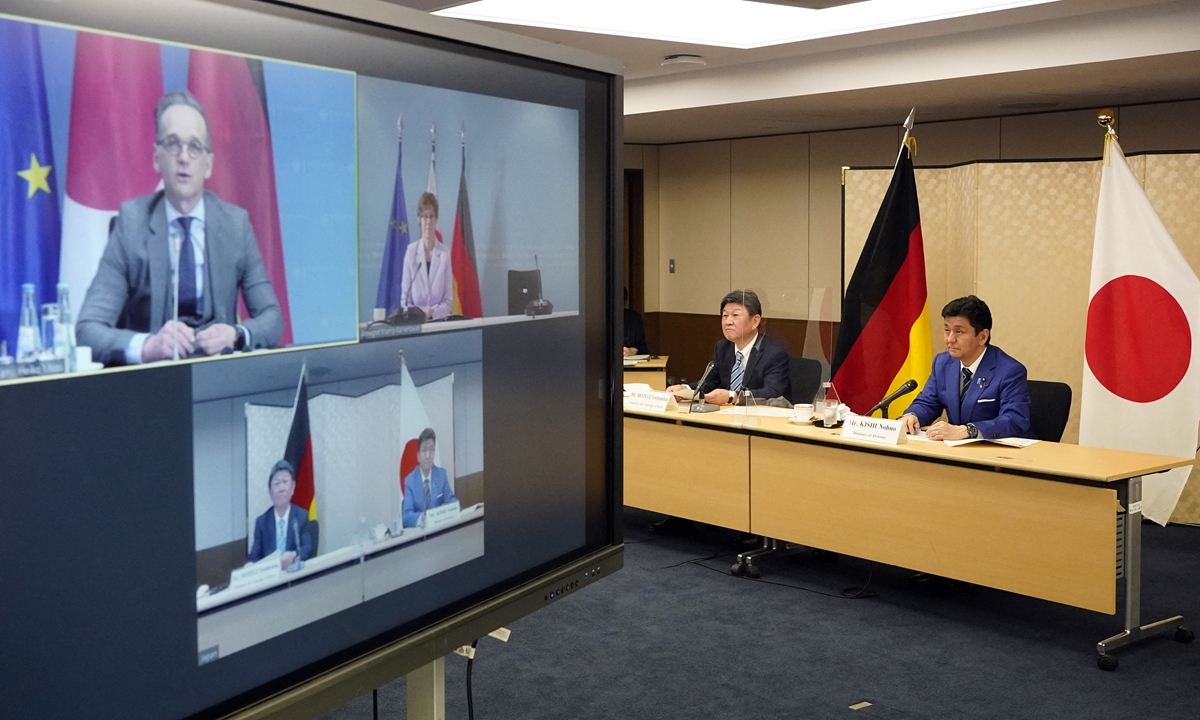
Japan's Foreign Minister Toshimitsu Motegi (2-R) and Defence Minister Nobuo Kishi (R) attend a video conference with German Foreign Minister Heiko Maas (top L, on screen) and Defence Minister Annegret Kramp-Karrenbauer (top R, on screen) at the Foreign Ministry in okyo on April 13, 2021. Photo: AFP
Unsurprisingly, China was on the agenda of the first security dialogue between the foreign and defense ministers of Germany and Japan, which was held on Tuesday via live video link. Reuters quoted a statement from Japan saying the two sides exchanged views on the East China Sea and South China Sea situation, and agreed on the importance of rules-based international order, during the "2 plus 2" dialogue.
This is surely something Western media outlets are eager to hype up. But observers point out that China is not all this Germany-Japan dialogue is about.
Sun Keqin, research fellow at the China Institutes of Contemporary International Relations, told the Global Times on Wednesday that Germany and Japan have always been relatively close among Western countries. They are not only major economic partner of each other, but also coordinate intimately on global affairs.
Berlin and Tokyo were major initiators of the Alliance for Multilateralism, an informal alliance of countries, mostly developed ones, which believe in multilateral cooperation. The alliance was launched in 2019 when the Trump administration was straining relations with not only US rivals but also allies alike. At that time, Europe was puzzled about where Trump was leading the US, and was expressing concerns about the West's decline.
Against this backdrop, Sun said the proactive promotion of the alliance by the two countries sent one signal: They hoped to carry the banner, or shoulder the leadership of the Western world, should something go wrong with the US, their previous leading figure.
After President Joe Biden assumed office, Washington started to adjust its policy toward its allies and has to some extent regained their trust. It has called on its partners to focus on China while continuing the Indo-Pacific Strategy.
So currently, the enhancement of collaboration between Germany and Japan is also a crucial link in the US-led grand anti-China alliance in the West, Sun noted. Washington has always wanted to form an "Asian NATO" in the Far East. It has been hoping its regional allies and NATO could join hands to establish a global strategic encirclement network to contain both China and Russia. The US has had this plan since the early stage of the Cold War, but failed to realize it. It failed over 70 years ago, and it won't be able to achieve it today either.
Granted, the two countries agreed on Tuesday to expand their military cooperation. Japan proposed joint naval drills with Germany, and the two sides agreed to look into the matter further. The prospect for the further promotion of bilateral military cooperation will be limited.
Japan does not even have an army. Its Constitution does not allow it to have offensive military forces. It only has the Self-Defense Force. Germany does have a full army, but just a restricted one. It is not allowed to possess certain strategic offensive weapons. Firm restrictions were placed on the German military after the two world wars. Until today, the country remains bound by military constraints. Its neighboring countries are also highly vigilant toward its military development. Hence, there is no possibility that Berlin and Tokyo will forge a military alliance, Sun noted, not to mention whether they could jointly interfere in China's peripheral waters though a military alliance.
In economic terms, Japan sees China as both a competitor and an opportunity. Meanwhile, the trade volume between China and Germany is bigger than that between the US and Germany.
"Germany may coordinate with the US in condemning China on human rights issues. It may also find excuses to accuse China's socialism, but if Washington wants it to completely take sides with the US to confront Beijing in a comprehensive way, Berlin won't say yes," Sun told Global Times.
Still, their interactions should be on China's radar. A German frigate will set sail for Asia in August and cross the South China Sea. It will also possibly take part in joint exercises with units of Japan's Self-Defense Force.
Germany and Japan may not opt for an all-out confrontation with China. Yet their relevant moves are undoubtedly hurting the atmosphere of cooperating with China. Beijing must make timely responses when needed, Sun said.




